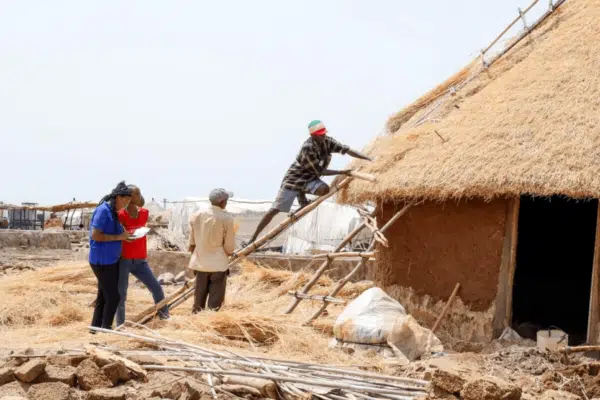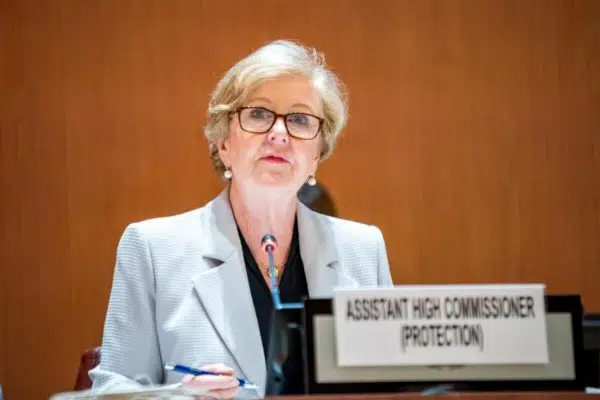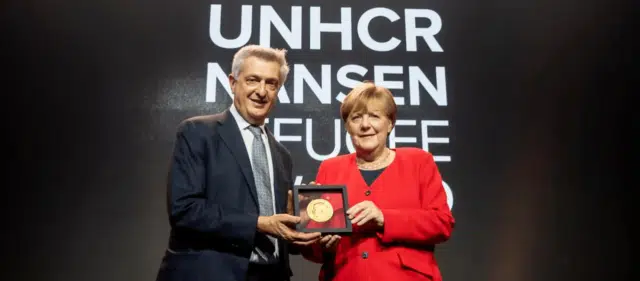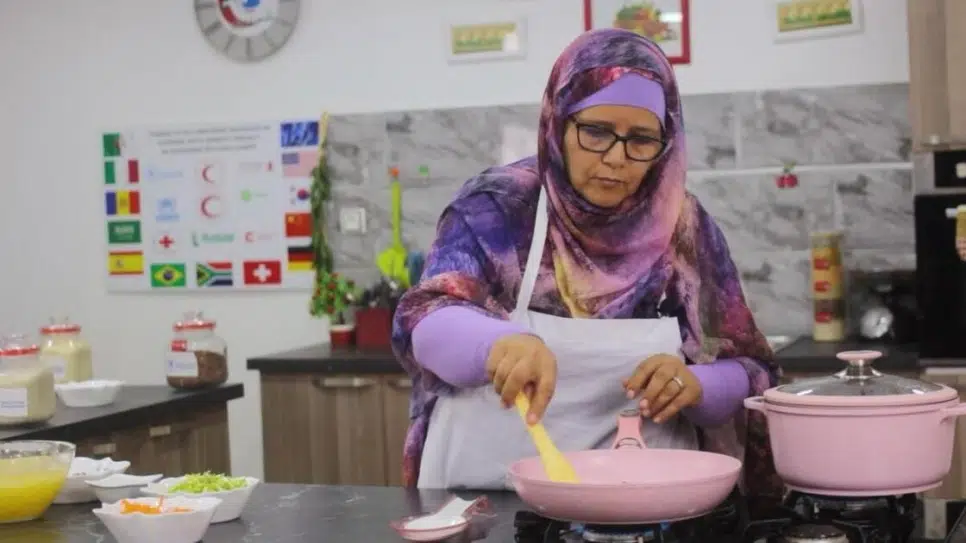
Haha demonstrates how to cook panafa, a dish of camel meat, onion, potatoes and spices, with vegetables as a side dish. © UNHCR/Adad Mohamed
In response to ration cuts and rising prices, Sahrawi refugees are watching an unusual cookery show to help them prepare nutritious meals with only a few ingredients
By Eunice Ohanusi in Tindouf, Algeria
Sahrawi refugees have lived in camps in Algeria’s remote desert region of Tindouf for decades. With the COVID-19 pandemic, the war in Ukraine, and spiralling food and transport costs stretching humanitarian funding, it has become harder for them to put food on the table.
Like many others, Muna Hamid, 35, is struggling to find food she can afford. “We no longer eat three meals in a day,” she said. “As a single mother of two, it is heartbreaking to watch my children skip meals, but I am not able to buy vegetables and fruits for them.”
Abdel Halim Elfaki, Acting Representative in Algeria for UNHCR, the UN Refugee Agency, says the situation is becoming critical. “Food rations have been cut with each individual receiving less than five kilogrammes per month, whereas before the ration used to be 17 kilogrammes,” he said, adding that it means that some refugees are now “receiving less than half of the minimum requirement of 2,100 calories per day”.
But even in the face of this crisis – with rising prices and lack of food in the market compounding the ration cuts – some in the camps are finding ways to provide nutritious food to their families. They are inspired by an unusual cookery show, presented by a Sahrawi refugee named Haha, who blends traditional Sahrawi meals with new recipes and ingredients. The show is called Min chway nadal chi zayn, meaning: “With few ingredients we make meals”.
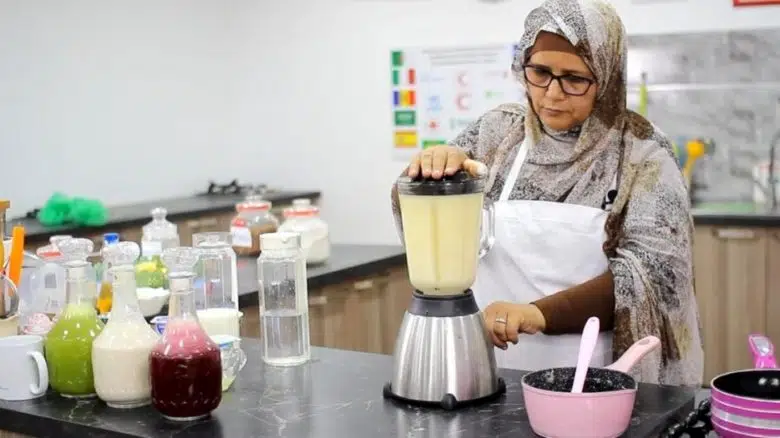
Haha prepares fruit drinks in a blender. © UNHCR/Adad Mohamed
“My TV show is basically a way to teach women and families how to prepare nutritious food with reduced food rations,” said Haha, speaking ahead of World Food Day on 16 October. “I always explain to people the health benefits of the meals I prepare.”
Haha is among 90,000 vulnerable Sahrawi refugees living in five camps around Tindouf. Some have been there for nearly half a century, victims of a protracted and often forgotten crisis that began more than 47 years ago in Western Sahara; a war that forced people to flee in search of safety. The region’s extreme weather conditions make it virtually impossible to grow food there, meaning they are almost entirely dependent on humanitarian aid and food assistance for their survival.
“When we started experiencing food reductions in the camps, we were concerned about the lack of food items, especially flour, which is a basic item in most of the food we eat,” said Haha. “Then, I decided to teach how to prepare our traditional recipes by using barley instead of flour, as well as using alternatives to rice.”
She has also revived the cooking of “zammit”, a traditional dough ball made from barley, oil, sugar, and water, that is served with tea for breakfast.
Haha’s recipes are based on what is available and affordable in the camps. “While preparing meals, I give preference to available vegetables that are inexpensive and can help prevent anaemia and malnutrition,” she said.
“Many women have told me how delicious the food they prepared at home tasted when they incorporated vegetables they would never otherwise have imagined … into their meals,” Haha added.
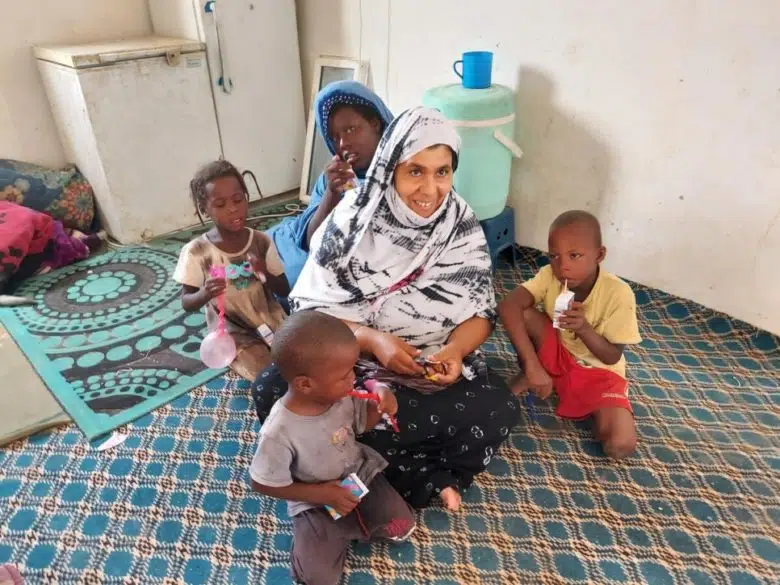
A neighbour visits Mohamed’s home bringing snacks and juice for his children. © UNHCR
Deheba, a 55-year-old grandmother, is a fan of Haha, and through the show has found new ways to provide essential nutritious food for her family twice a day. “The health of my grandchildren, Zahra and Ibrahim, has been a worrying concern for me since the [COVID-19] lockdown,” she said.
“What I learned from Haha’s cooking show is so informative and supports the well-being of my family despite the food shortages we have been experiencing in the camps,” Deheba added.
Following the end of the pandemic restrictions, refugees reported widespread loss of income, which made it challenging for them to cover their basic needs. Among those struggling to provide nutritious food for their families is Mohamed, a 65-year-old widower and father of six children, aged between three and 17 years, who lost his small herd of goats due to a disease that affected livestock in the camps during the pandemic.
From a refurbished refrigerator, he fills a cup with camel milk to feed to his 3-year-old daughter. “I don’t have money to buy food for my children,” he said.
“We are not going to bed hungry today.”
During Ramadan, UNHCR provided fresh food and monthly distributions of yeast for baking bread, as well as therapeutic feeding for children to treat and prevent malnutrition. The World Food Programme is responding with vouchers for fresh food for pregnant and breastfeeding mothers, as well as the monthly food basket that has been reduced in size because of the funding shortfall
As Deheba’s family gathers in the evening to drink tea, the importance of a healthy, nutritious supper is at the forefront of the grandmother’s mind. She thinks about what to cook as her 7-year-old granddaughter charges back into the house after playing outside with neighbours.
“Tonight, I am not sure what I am going to cook for dinner, [but] I have some carrots, onions, and tomatoes,” she said, glancing around the kitchen. “Very nice, we are not going to bed hungry today.”
Originally published by UNHCR on 14 October 2022.



